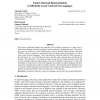498 search results - page 65 / 100 » Learning structured prediction models: a large margin approa... |
102
click to vote
JMLR
2010
14 years 4 months ago
2010
We present a polynomial update time algorithm for the inductive inference of a large class of context-free languages using the paradigm of positive data and a membership oracle. W...
76
Voted
TIP
2008
14 years 9 months ago
2008
This paper presents recursive cavity modeling--a principled, tractable approach to approximate, near-optimal inference for large Gauss-Markov random fields. The main idea is to su...
82
Voted
ISBI
2008
IEEE
15 years 10 months ago
2008
IEEE
We propose a method for recursive segmentation of the left ventricle (LV) across a temporal sequence of magnetic resonance (MR) images. The approach involves a technique for learn...
104
click to vote
CIKM
2009
Springer
15 years 4 months ago
2009
Springer
The study of collective behavior is to understand how individuals behave in a social network environment. Oceans of data generated by social media like Facebook, Twitter, Flickr a...
100
click to vote
JMLR
2010
14 years 8 months ago
2010
Convolution kernels for trees provide simple means for learning with tree-structured data. The computation time of tree kernels is quadratic in the size of the trees, since all pa...


